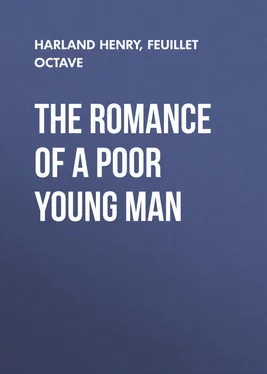Henry Harland - The Romance of a Poor Young Man
Здесь есть возможность читать онлайн «Henry Harland - The Romance of a Poor Young Man» — ознакомительный отрывок электронной книги совершенно бесплатно, а после прочтения отрывка купить полную версию. В некоторых случаях можно слушать аудио, скачать через торрент в формате fb2 и присутствует краткое содержание. Жанр: foreign_antique, foreign_prose, на английском языке. Описание произведения, (предисловие) а так же отзывы посетителей доступны на портале библиотеки ЛибКат.
- Название:The Romance of a Poor Young Man
- Автор:
- Жанр:
- Год:неизвестен
- ISBN:нет данных
- Рейтинг книги:5 / 5. Голосов: 1
-
Избранное:Добавить в избранное
- Отзывы:
-
Ваша оценка:
- 100
- 1
- 2
- 3
- 4
- 5
The Romance of a Poor Young Man: краткое содержание, описание и аннотация
Предлагаем к чтению аннотацию, описание, краткое содержание или предисловие (зависит от того, что написал сам автор книги «The Romance of a Poor Young Man»). Если вы не нашли необходимую информацию о книге — напишите в комментариях, мы постараемся отыскать её.
The Romance of a Poor Young Man — читать онлайн ознакомительный отрывок
Ниже представлен текст книги, разбитый по страницам. Система сохранения места последней прочитанной страницы, позволяет с удобством читать онлайн бесплатно книгу «The Romance of a Poor Young Man», без необходимости каждый раз заново искать на чём Вы остановились. Поставьте закладку, и сможете в любой момент перейти на страницу, на которой закончили чтение.
Интервал:
Закладка:
These have been two cruel days; uncertainty is the worst of all evils, because it is the only one that necessarily stops the springs of action and checks our courage. I should have been very much surprised if, ten years ago, any one had told me that the old notary, whose formal language and stiff politeness so much amused my father and me, would one day be the oracle from whom I should await the supreme sentence of my destiny.
I do my best to guard against excessive hopes; I have calculated approximately that, after paying all the debts, we should have a hundred and twenty to a hundred and fifty thousand francs left. A fortune of five millions should leave so much salvage at least. I intend to take ten thousand francs and seek my fortune in the new States of America; the rest I shall resign to my sister.
Enough of writing for to-night. Recalling such memories is a mournful occupation. Nevertheless, I feel that it has made me calmer. Work is surely a sacred law, since even the lightest task discharged brings a certain contentment and serenity. Yet man does not love work; he cannot fail to see its good effects; he tastes them every day, and blesses them, and each day he comes to his work with the same reluctance. I think that is a singular and mysterious contradiction, as if in toil we felt at once a chastisement, and the divine and fatherly hand of the chastiser.
ThursdayWhen I woke this morning a letter from old M. Laubépin was brought to me. He invited me to dinner and apologized for taking such a liberty. He said nothing about my affairs. I augured unfavourably from this silence.
In the meantime I fetched my sister from her convent, and took her about Paris. The child knows nothing of our ruin. In the course of the day she had some rather expensive fancies. She provided herself liberally with gloves, pink note-paper, bonbons for her friends, delicate scents, special soaps, and tiny pencils, all very necessary useful things, but not as necessary as a dinner. May she never have to realize this!
At six o'clock I was at M. Laubépin's in the Rue Cassette. I do not know our old friend's age, but to-day I found him looking just the same as ever – tall and thin, with a little stoop, untidy white hair, and piercing eyes under bushy black eyebrows – altogether a face at once strong and subtle. I recognised the unvarying costume, the old-fashioned black coat, the professional white cravat, the family diamond in the shirt-frill – in short, all the outward signs of a serious, methodical, and conservative nature. The old gentleman was waiting for me at the open door of his little salon . After making me a low bow, he took my hand lightly between two of his fingers and conducted me to a homely looking old lady who was standing by the fire-place.
"The Marquis de Champcey d'Hauterive!" said M. Laubépin, in his strong, rich, and emphatic voice, and turning quickly to me, added in a humbler tone, "Mme. Laubépin!"
We sat down. An awkward silence ensued. I had expected an immediate explanation of my position. Seeing that this was to be postponed, I assumed at once that it was unfavourable, an assumption confirmed by the discreet and compassionate glances with which Mme. Laubépin furtively honoured me. As for M. Laubépin, he observed me with a remarkable attention not altogether kindly. My father, I remember, always maintained that at the bottom of his heart and under his respectful manner the ceremonious old scrivener had a little of bourgeois democratic and even Jacobin leaven. It seemed to me that this leaven was working just now, and that the old man found some satisfaction for his secret antipathies in the spectacle of a gentleman under torture. In spite of my real depression, I began to talk at once, trying to appear quite unconcerned.
"So, M. Laubépin," I said, "you've left the Place des Petits-Pères, the dear old Place. How could you bring yourself to do it? I would never have believed it of you."
" Mon Dieu , marquis," replied M. Laubépin, "I must admit that it is an infidelity unbecoming at my age; but in giving up the practice I had to give up my chambers as well, for one can't carry off a notary's plate as one can a sign-board."
"But you still undertake some business?"
"Yes, in a friendly way, marquis. Some of the honourable families, the important families, whose confidence I have had the good fortune to secure in the course of forty-five years of practice, are still glad, especially in situations of unusual delicacy, to have the benefit of my experience, and I believe I may say they rarely regret having followed my advice."
As M. Laubépin finished this testimonial to his own merits, an old servant came in and announced that dinner was served. It was my privilege to conduct Mme. Laubépin into the adjacent dining-room. Throughout the meal the conversation never rose above the most ordinary commonplaces. M. Laubépin continued to look at me in the same penetrating and ambiguous manner, while Mme. Laubépin offered me each dish in the mournful and compassionate tone we use at the bedside of an invalid. In time we left the table, and the old notary took me into his study, where coffee was served immediately. He made me sit down, and standing before the fireplace, began:
"Marquis," he said, "you have done me the honour of intrusting to me the administration of the estate of your father, the late Marquis de Champcey d'Hauterive. Yesterday I was about to write to you, when I learned of your arrival in Paris. This enables me to convey to you, vivâ voce , the result of my zeal and of my action."
"I foresee, M. Laubépin, that the result is not favourable."
"Marquis, it is not favourable, and you will need all your courage to bear it. But it is my rule to proceed methodically. – In the year 1820 Mlle. Louise Hélène Dugald Delatouche d'Erouville was sought in marriage by Charles-Christian Odiot, Marquis de Champcey d'Hauterive. A tradition a century old had placed the management of the Dugald Delatouche affairs in my hands, and I was further permitted a respectful intimacy with the young heiress of the house. I thought it my duty, therefore, to oppose her infatuation by every argument in my power and to dissuade her from this deplorable alliance. I say deplorable alliance without reference to M. de Champcey's fortune, which was nearly equal to that of Mlle. Delatouche, though even at this time he had mortgaged it to some extent. I say so because I knew his character and temperament, which were in the main hereditary. Under the fascinating and chivalrous manner common to all of his race I saw clearly the heedless obstinacy, the incurable irresponsibility, the mania for pleasure, and, finally, the pitiless selfishness."
"Sir," I interrupted sharply, "my father's memory is sacred to me, and so it must be to every one who speaks of him in my presence."
"Sir," replied the old man with a sudden and violent emotion, "I respect that sentiment, hut when I speak of your father I find it hard to forget that he was the man who killed your mother, that heroic child, that saint, that angel!"
I had risen in great agitation. M. Laubépin, who had taken a few steps across the room, seized my arm. "Forgive me, young man," he said to me. "I loved your mother and wept for her. You must forgive me." Then returning to the fire-place, he continued in his usual solemn tone:
"I had the honour and the pain of drawing up your mother's marriage contract.
"In spite of my remonstrance, the strict settlement of her property upon herself had not been adopted, and it was only with much difficulty that I got included in the deed a protective clause by which about a third of your mother's estate could not be sold, except with her consent duly and legally authenticated. A useless precaution, marquis; I might call it the cruel precaution of an ill-advised friendship. This fatal clause brought most intolerable sufferings to the very person whose peace it was intended to secure. I refer to the disputes and quarrels and wrangles the echo of which must sometimes have reached your ears, and in which, bit by bit, your mother's last heritage – her children's bread – was torn from her!"
Читать дальшеИнтервал:
Закладка:
Похожие книги на «The Romance of a Poor Young Man»
Представляем Вашему вниманию похожие книги на «The Romance of a Poor Young Man» списком для выбора. Мы отобрали схожую по названию и смыслу литературу в надежде предоставить читателям больше вариантов отыскать новые, интересные, ещё непрочитанные произведения.
Обсуждение, отзывы о книге «The Romance of a Poor Young Man» и просто собственные мнения читателей. Оставьте ваши комментарии, напишите, что Вы думаете о произведении, его смысле или главных героях. Укажите что конкретно понравилось, а что нет, и почему Вы так считаете.












